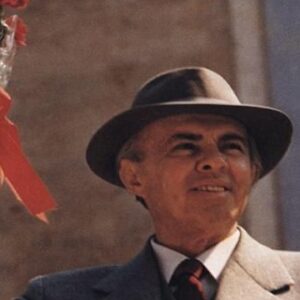Enver Halil Hoxha was Albania’s supreme leader for nearly 41 years, during which time he ruled the country with an iron fist and shaped the country’s future. Enver Hoxha attended French universities and developed a strong interest in communism during his time there. When he was barely out of his teens, he attended meetings held by the French Communist Party and formed his own opinions on a socialist state. He was a founding member of the Communist Part of Albania and served as the organization’s first secretary. Hoxha remained the party’s first secretary for the rest of his life, as well as serving as Prime Minister for a decade beginning in 1944. He was also the commander-in-chief of the armed forces at the same time. Hoxha was influenced by Joseph Stalin’s leadership style and was known for ordering political opponents’ imprisonment or assassination. On the other hand, he was in charge of agricultural land redistribution, which increased production, as well as ensuring that every Albanian had access to electricity. Hoxha is without a doubt one of Albania’s most influential figures.
Childhood and Adolescence
Enver Halil Hoxha was born on October 16, 1908, in Gjirokaster, which is now part of Albania but was ruled by the Ottoman Empire at the time of his birth. His father, Halil Hoxha, was a successful clothing merchant who traveled around the world on business. Gjylihan Hoxha was his mother’s name.
Enver Hoxha began his education at a French secondary school in Korce, then went on to the American Technical School in Tirana. At the school, Hoxha studied French history and philosophy. He read the ‘Communist Manifesto’ for the first time here.
Enver Hoxha was awarded a scholarship to study natural sciences at the University of Montpellier in 1930, but he dropped out to pursue his interest in philosophy. He took classes at Paris’ prestigious Sorbonne but did not receive a diploma. It was around this time that he began attending French Communist Party meetings.
Enver Hoxha began working as a secretary at the Albanian consulate in Brussels, Belgium, in 1934, and stayed for two years before his employment was terminated due to the discovery of communist literature in his possession. He returned to Albania and began teaching at his old Korce school.
Career of Enver
Albania was invaded by the Italians in 1939, and a Fascist government was installed. Enver Hoxha was fired from his job at the school after refusing to join the Albanian Fascist Party. He became one of the founding members of the Albanian Communist Party two years later, and served as the party’s first secretary for nearly 44 years.
Albania was liberated in 1944, and Enver Hoxha became the country’s Prime Minister and all-powerful head of state the following year. During his tenure as Prime Minister, he ruled the country in the manner of his idol Joseph Stalin, redistributing land by confiscating land from large landowners, improving health care, and raising literacy rates. He was Prime Minister for a decade, during which time he improved relations with the Soviet Union.
In 1956, Enver Hoxha called a meeting of all party members with the goal of cementing his position as the party’s supreme leader, and after the resolution was passed, all those who opposed it were sentenced to prison. The following year, Hoxha traveled to China and met with Mao Zedong. Around the same time, Chinese aid to Albania increased, and Albania’s relationship with the Soviets soured.
Enver Hoxha also championed women’s rights and helped Albania transition from a patriarchal to an egalitarian society. The party announced a campaign in 1960 to provide electricity to every Albanian, and the goal was met within a decade. Hoxha also ordered the construction of one-man bunkers to ensure that a large portion of the population would be safe in the event that the country was attacked.
At the Seventh Congress of the Albanian Party of Labour in 1976, a new constitution was established, with Enver Hoxha leading the charge for the new constitution because he wanted to build the ideal socialist state. Around this time, Hoxha was also instrumental in ushering in an era of Albanian self-sufficiency by borrowing as little as possible, despite the fact that the people’s living standards were low.
Hoxha had become a larger-than-life figure in Albania during his years as leader, and his method of operation was very similar to Stalin’s in that he killed or imprisoned anyone who opposed him. Clerics from various faiths were imprisoned. Hoxha ordered the assassinations of a number of party members who he believed did not share his philosophy in order to ensure that his successors shared his philosophy. Ramiz Alia was chosen as his successor.
Major Projects of Enver
Enver Hoxha ruled Albania with an iron fist for nearly 41 years, transforming the country in a variety of ways. His most significant contribution, however, was the way he redistributed land confiscated from wealthy landowners and distributed it to farmers. Albania became self-sufficient as a result of the measure, which helped boost agricultural production.
Personal History and Legacy
Enver Hoxha married Nexhmije Xhuglini, a fellow communist party member, shortly after WWII ended, but the exact date of their marriage is unknown. Ilir and Sokol were their sons, and Pranvera was their daughter. Enver Hoxha died in Tirana on April 11, 1985, after suffering a ventricular fibrillation attack.
Estimated Net worth
Enver is one of the wealthiest World Leaders and one of the most popular. Enver Hoxha’s net worth is estimated to be $1.5 million, according to Wikipedia, Forbes, and Business Insider.


